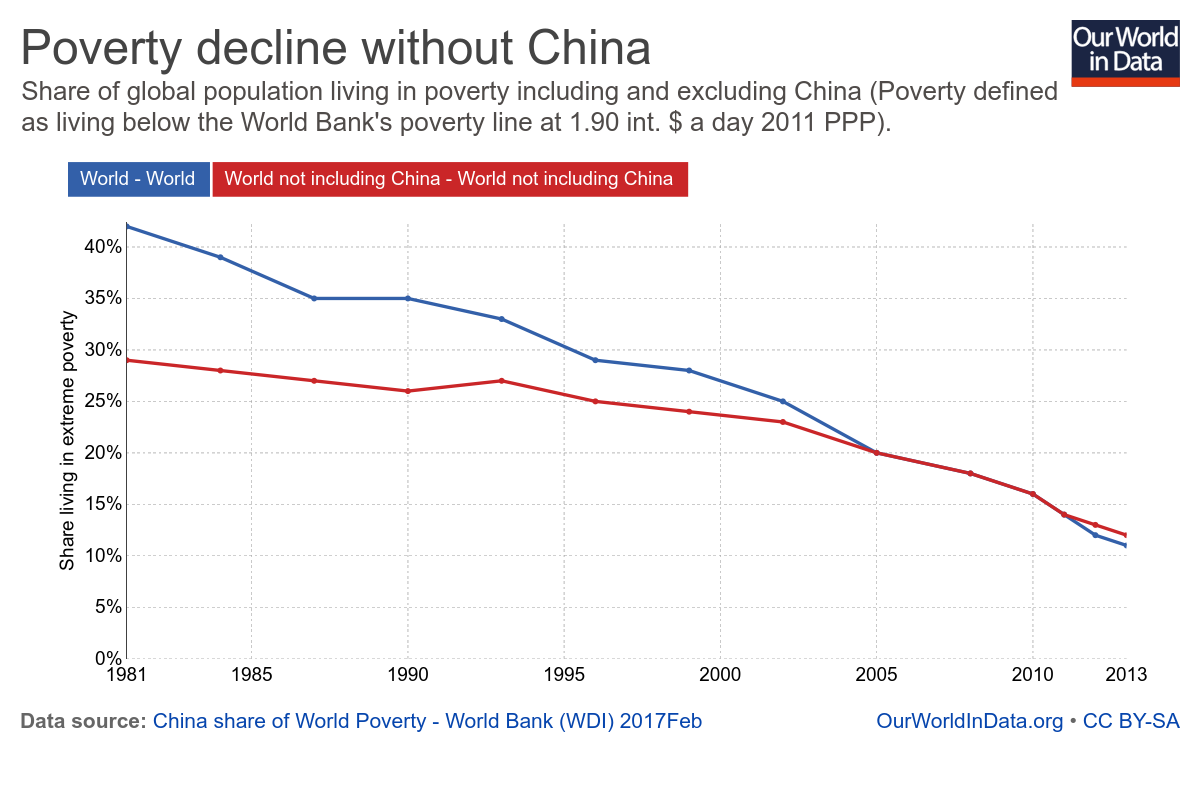Jucheguevara (talk | contribs) No edit summary Tag: Visual edit |
No edit summary Tag: Visual edit |
||
| Line 1: | Line 1: | ||
'''Poverty''' is the state of not having enough material wealth or income to support a person's basic needs. Modern capitalist states are embroiled with strife due to poverty<ref>[https://nypost.com/2019/12/25/how-america-is-reverting-back-to-the-feudal-age/ How America is reverting back to the feudal age] by Joel Kotkin on New York Post</ref><ref>[https://www.fairobserver.com/region/north_america/poverty-in-america-third-world-country-malaria-world-news-23993/ America: A Third World Country without Malaria] by Atul Singh on Fair Observer</ref><ref>{{News citation|journalist=Deutsche Welle|date=|title=How poor people survive in the USA {{!}} DW Documentary|url=https://youtu.be/JHDkALRz5Rk|newspaper=[[Deutsche Welle]]|archive-url=|archive-date=|retrieved=}}</ref> | [[File:China's role in global poverty rate decline .png|thumb|333x333px|China's role in global [[Poverty reduction|poverty rate decline]], data from the [[World Bank]]<ref>[https://ourworldindata.org/the-global-decline-of-extreme-poverty-was-it-only-china The global decline of extreme poverty – was it only China?] by Max Roser on Our World in Data</ref>]]'''Poverty''' is the state of not having enough material wealth or income to support a person's basic needs. The [[Bourgeoisie|ruling class]] intentionally creates poverty to enrich themselves.<ref name=":92">{{Citation|author=[[Nick Estes]], et al.|year=2021|title=Red Nation Rising|chapter=Anti-Indianism|page=32|pdf=https://cloudflare-ipfs.com/ipfs/bafykbzacechp4anuu3vkx7ttze5vwtbbslqpqkouqemkpa5xui27eulvyntx2?filename=Nick%20Estes%2C%20Melanie%20Yazzie%2C%20Jennifer%20Nez%20Denetdale%2C%20David%20Correia%20-%20Red%20Nation%20Rising_%20From%20Bordertown%20Violence%20to%20Native%20Liberation-PM%20Press%20%282021%29.pdf}}</ref> Modern [[Capitalism|capitalist]] states are embroiled with strife due to poverty,<ref>[https://nypost.com/2019/12/25/how-america-is-reverting-back-to-the-feudal-age/ How America is reverting back to the feudal age] by Joel Kotkin on New York Post</ref><ref>[https://www.fairobserver.com/region/north_america/poverty-in-america-third-world-country-malaria-world-news-23993/ America: A Third World Country without Malaria] by Atul Singh on Fair Observer</ref><ref>{{News citation|journalist=Deutsche Welle|date=|title=How poor people survive in the USA {{!}} DW Documentary|url=https://youtu.be/JHDkALRz5Rk|newspaper=[[Deutsche Welle]]|archive-url=|archive-date=|retrieved=}}</ref> while the [[Socialism|socialist]] and [[Anti-imperialism|anti-imperialist]] world has seen immense successes in lifting their populations out of poverty.<ref>[https://news.cgtn.com/news/2021-10-23/Chart-of-the-Day-China-as-a-facilitator-of-global-poverty-alleviation-14xuxnfuQbC/index.html Chart of the Day: China as a facilitator of global poverty alleviation] by [[CGTN]]</ref> As a result of the [[Overthrow of the Soviet Union|1991 counterrevolution]] against the [[Union of Soviet Socialist Republics (1922–1991)|Soviet Union]], poverty rose from 1% to 29% in the [[Baltics]], 1% to 22% in [[Republic of Belarus|Belarus]], 4% to 66% in [[Republic of Moldova|Moldova]], 2% to 50% in [[Russian Federation|Russia]], 2% to 63% in [[Ukraine]], and 15% to 66% in [[Central Asia]].<ref>{{Citation|author=Branko Milanovic|year=1998|title=Income, Inequality, and Poverty during the Transition from Planned to Market Economy|chapter=Poverty|section=By How Much Has Poverty Increased?|page=68|pdf=https://web.archive.org/web/20210314180055/https://www.gc.cuny.edu/CUNY_GC/media/CUNY-Graduate-Center/PDF/Centers/LIS/Milanovic/papers/Income_ineq_poverty_book.pdf|city=[[Washington, D.C.]]|publisher=[[World Bank]]|isbn=082133994X}}</ref> | ||
== See also == | == See also == | ||
| Line 5: | Line 5: | ||
* [[Poverty reduction]] | * [[Poverty reduction]] | ||
*[[Post-scarcity|Post-scarcity economics]] | *[[Post-scarcity|Post-scarcity economics]] | ||
== References == | == References == | ||
Latest revision as of 15:57, 7 April 2023

Poverty is the state of not having enough material wealth or income to support a person's basic needs. The ruling class intentionally creates poverty to enrich themselves.[2] Modern capitalist states are embroiled with strife due to poverty,[3][4][5] while the socialist and anti-imperialist world has seen immense successes in lifting their populations out of poverty.[6] As a result of the 1991 counterrevolution against the Soviet Union, poverty rose from 1% to 29% in the Baltics, 1% to 22% in Belarus, 4% to 66% in Moldova, 2% to 50% in Russia, 2% to 63% in Ukraine, and 15% to 66% in Central Asia.[7]
See also
References
- ↑ The global decline of extreme poverty – was it only China? by Max Roser on Our World in Data
- ↑ Nick Estes, et al. (2021). Red Nation Rising: 'Anti-Indianism' (p. 32). [PDF]
- ↑ How America is reverting back to the feudal age by Joel Kotkin on New York Post
- ↑ America: A Third World Country without Malaria by Atul Singh on Fair Observer
- ↑ Deutsche Welle. "How poor people survive in the USA | DW Documentary" Deutsche Welle.
- ↑ Chart of the Day: China as a facilitator of global poverty alleviation by CGTN
- ↑ Branko Milanovic (1998). Income, Inequality, and Poverty during the Transition from Planned to Market Economy: 'Poverty; By How Much Has Poverty Increased?' (p. 68). [PDF] Washington, D.C.: World Bank. ISBN 082133994X